Concawe Review
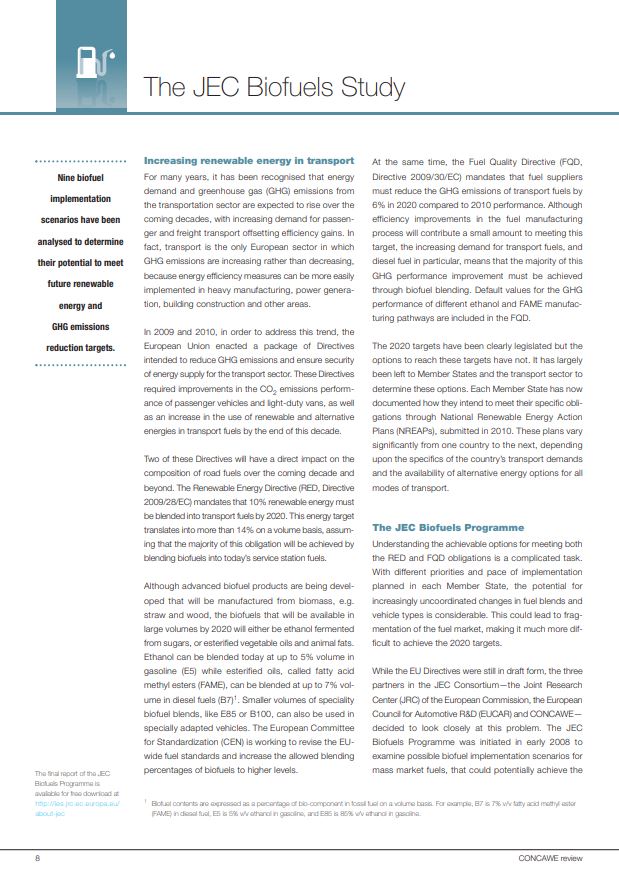
Concawe Reviews
The JEC Biofuels Study
For many years, it has been recognised that energy demand and greenhouse gas (GHG) emissions from the transportation sector are expected to rise over the coming decades, with increasing demand for...
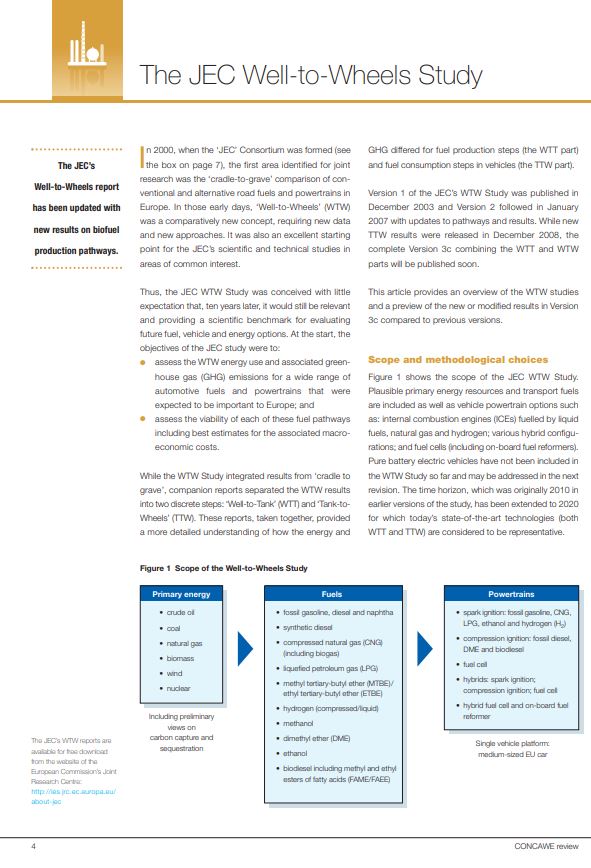
Concawe Reviews
The JEC Well-to-Wheels Study
In 2000, when the ‘JEC’ Consortium was formed (see the box on page 7), the first area identified for joint research was the ‘cradle-to-grave’ comparison of conventional and alternative road...
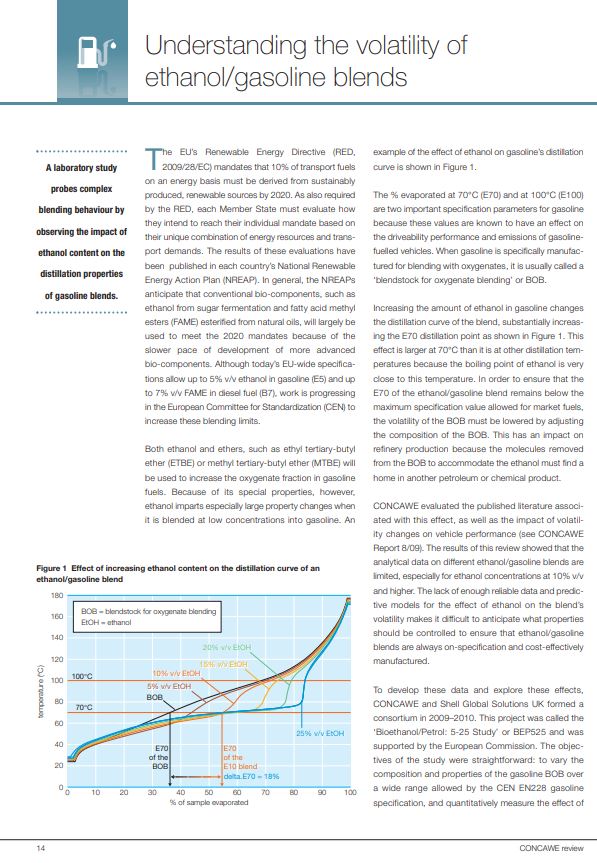
Concawe Reviews
Understanding the volatility of ethanol/gasoline blends
The EU’s Renewable Energy Directive (RED, 2009/28/EC) mandates that 10% of transport fuels on an energy basis must be derived from sustainably produced, renewable sources by 2020. As also require...

Concawe Reviews
CONCAWE Review • Spring 2011
Volume 20, Number 1: In 2010, CONCAWE and its Member Companies successfully completed the first phase of REACH (Registration, Evaluation, Authorisation and Restriction of Chemicals). CONCAWE was respo...
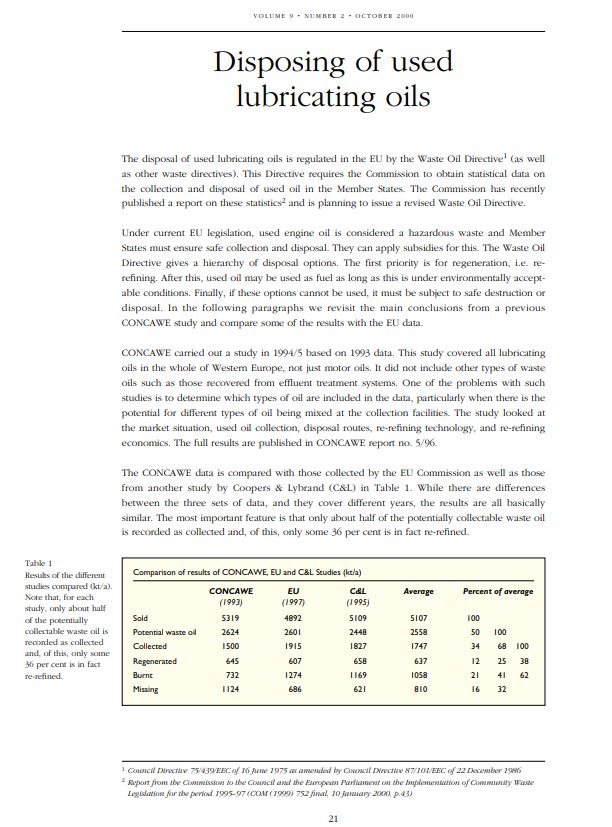
Concawe Reviews
Disposing of used lubricating oils
The disposal of used lubricating oils is regulated in the EU by the Waste Oil Directive1 (as well as other waste directives). This Directive requires the Commission to obtain statistical data on the c...
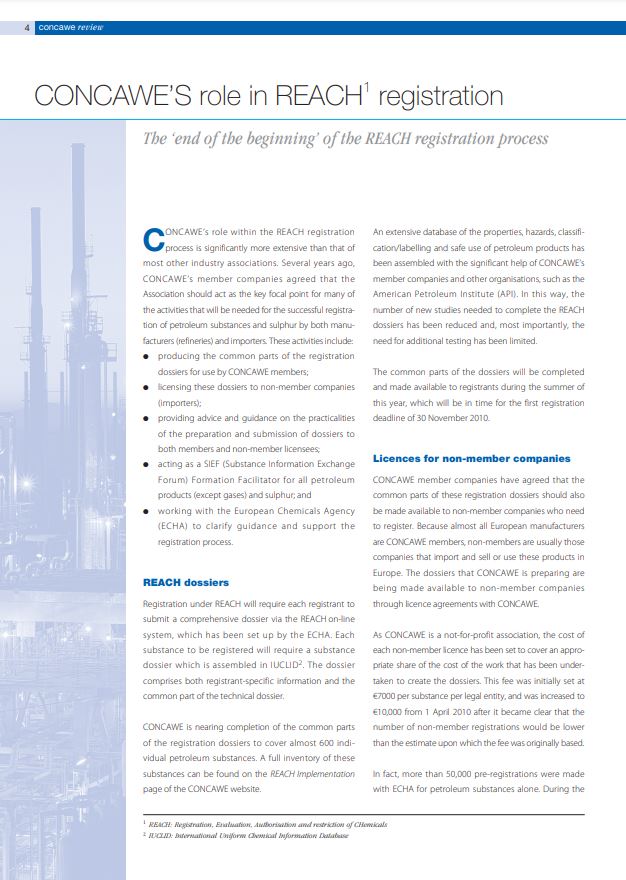
Concawe Reviews
CONCAWE’S role in REACH registration
CONCAWE’s role within the REACH registration process is significantly more extensive than that of most other industry associations.
Several years ago, CONCAWE’s member companies agreed that...
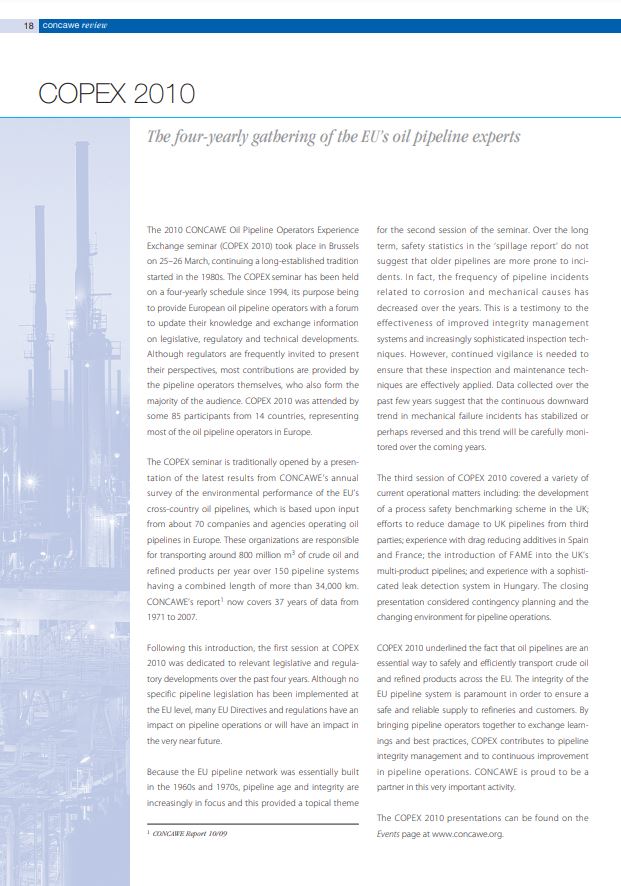
Concawe Reviews
COPEX 2010
The 2010 CONCAWE Oil Pipeline Operators Experience Exchange seminar (COPEX 2010) took place in Brusselson 25–26 March, continuing a long-established tradition started in the 1980s. The COPEX semin...
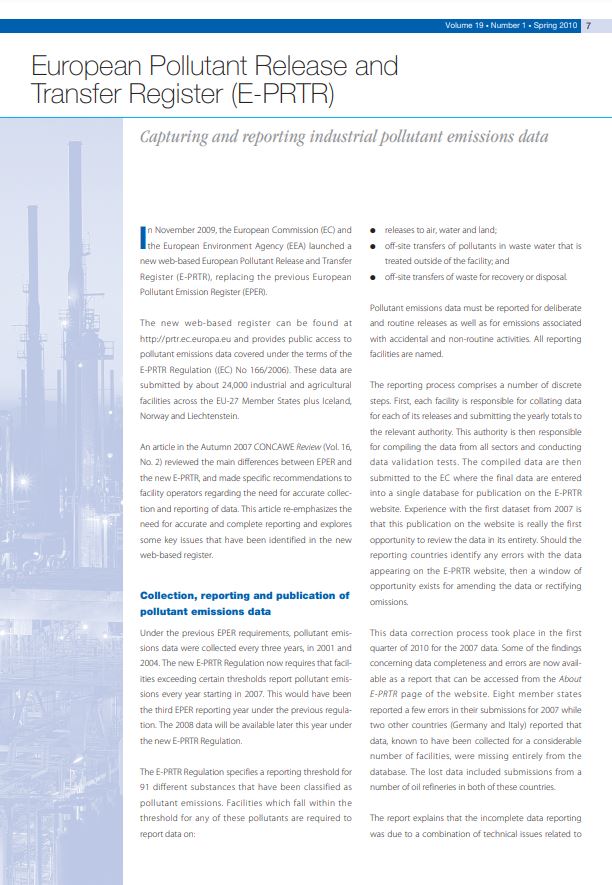
Concawe Reviews
European Pollutant Release and Transfer Register (E-PRTR)
In November 2009, the European Commission (EC) and the European Environment Agency (EEA) launched a new web-based European Pollutant Release and Transfer Register (E-PRTR), replacing the previous E...
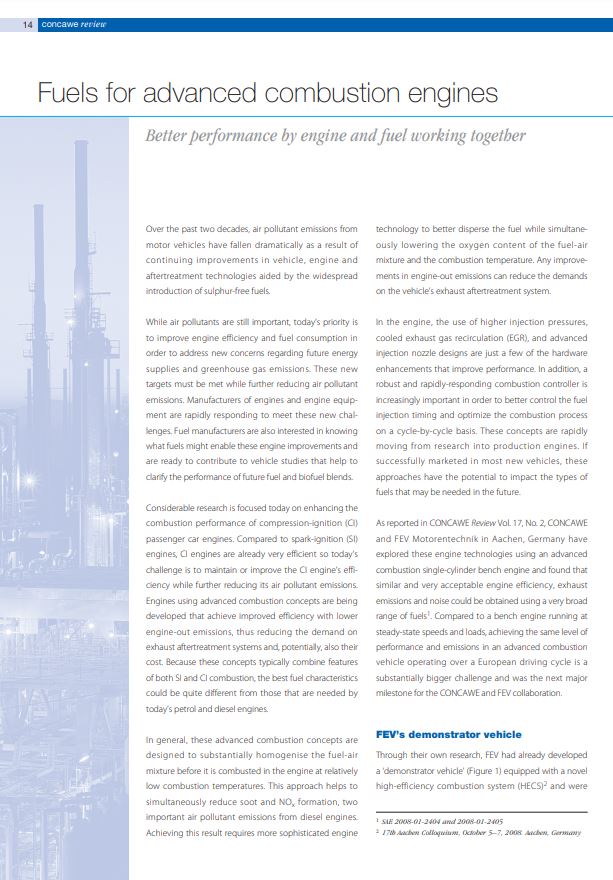
Concawe Reviews
Fuels for advanced combustion engines
Over the past two decades, air pollutant emissions from motor vehicles have fallen dramatically as a result of continuing improvements in vehicle, engine and after treatment technologies aided by the...
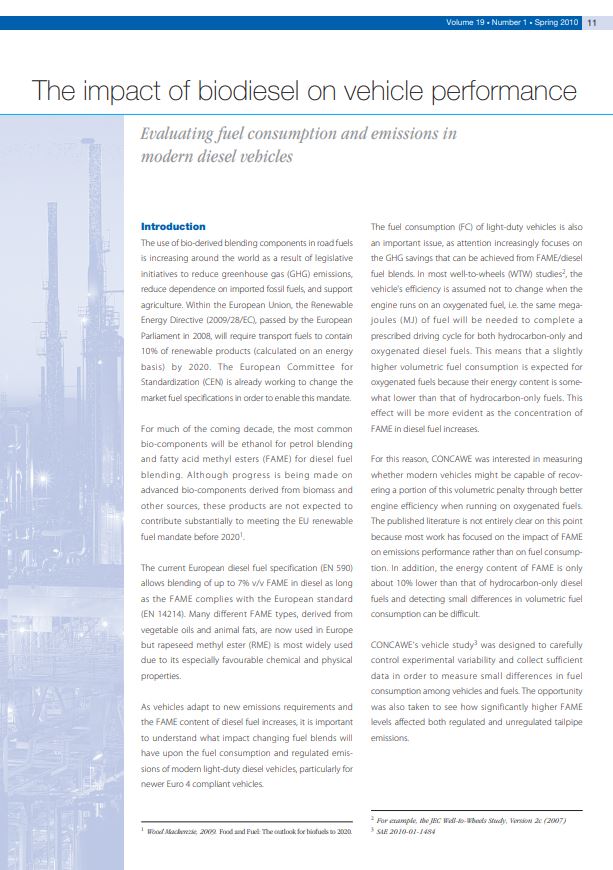
Concawe Reviews
The impact of biodiesel on vehicle performance
The use of bio-derived blending components in road fuels is increasing around the world as a result of legislative initiatives to reduce greenhouse gas (GHG) emissions, reduce dependence on imported f...

Concawe Reviews
CONCAWE Review – Spring 2010
Volume 19 • Number 1: Content of this Concawe Review:
CONCAWE’S Role in REACH Registration. The ‘end of the beginning’ of the REACH registration process;
European Pollutant Release and...
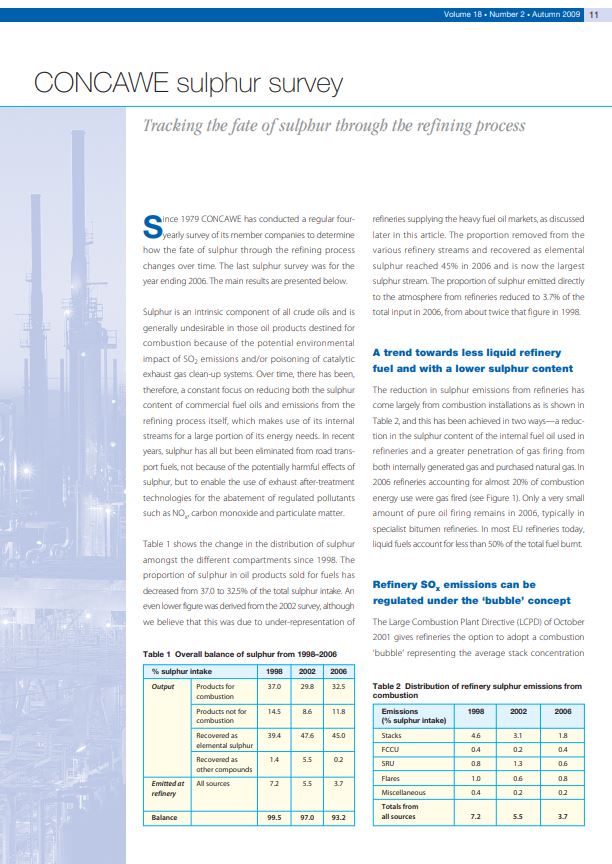
Concawe Reviews
CONCAWE sulphur survey
Since 1979 CONCAWE has conducted a regular fouryearly survey of its member companies to determine how the fate of sulphur through the refining process changes over time.
The last sulphur survey...
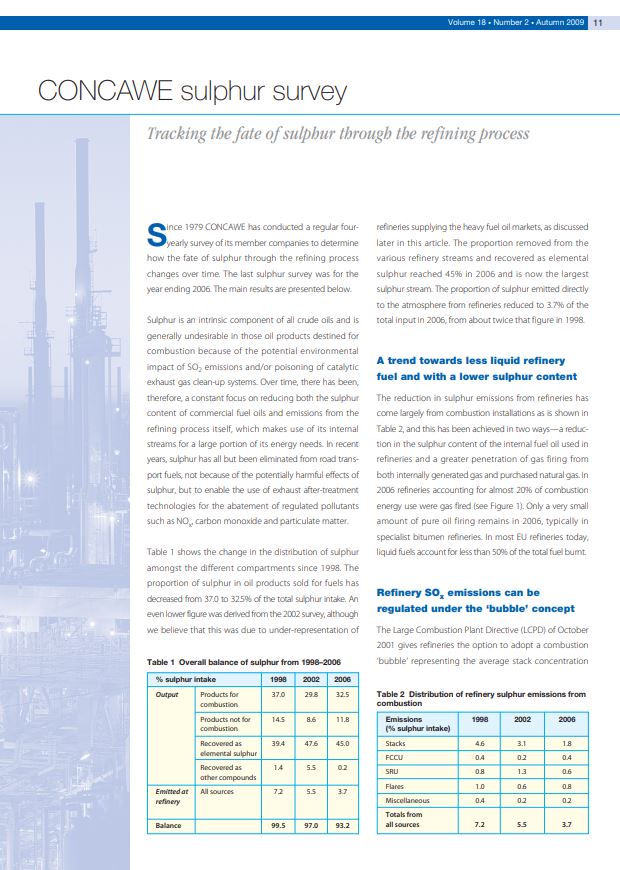
Concawe Reviews
CONCAWE sulphur survey
Since 1979 CONCAWE has conducted a regular fouryearly survey of its member companies to determine how the fate of sulphur through the refining process changes over time.
The last sulphur survey...
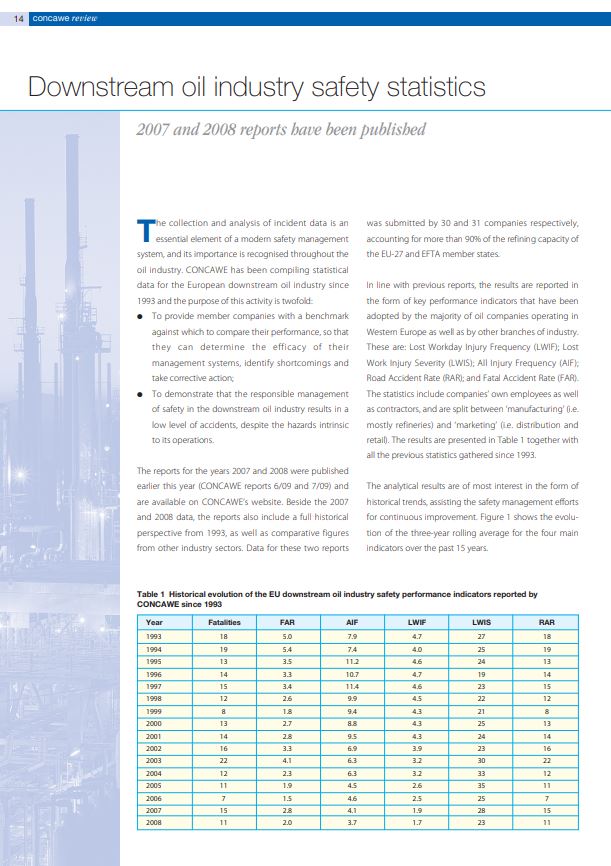
Concawe Reviews
Downstream oil industry safety statistics
The collection and analysis of incident data is an essential element of a modern safety management system, and its importance is recognised throughout the oil industry. CONCAWE has been compiling s...
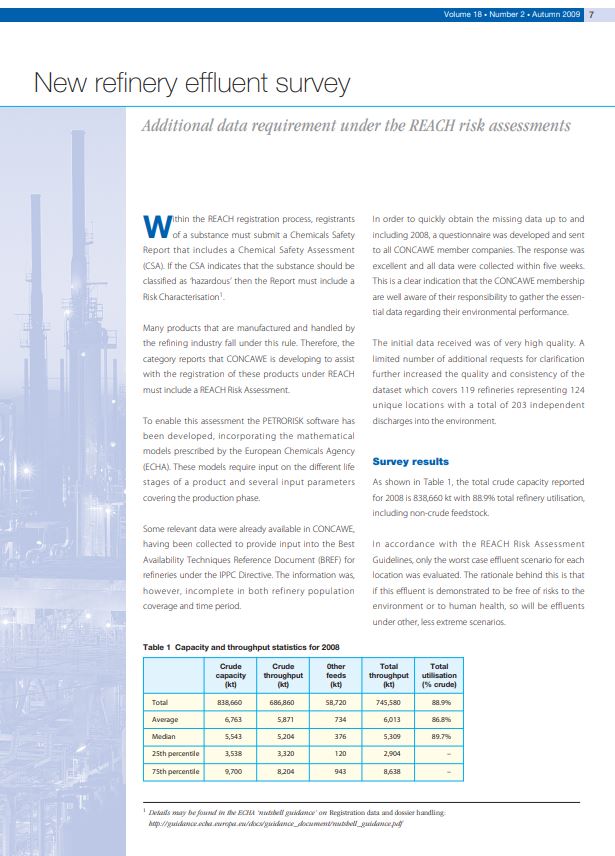
Concawe Reviews
New refinery effluent survey
Within the REACH registration process, registrants of a substance must submit a Chemicals Safety Report that includes a Chemical Safety Assessment (CSA).
If the CSA indicates that the substance...
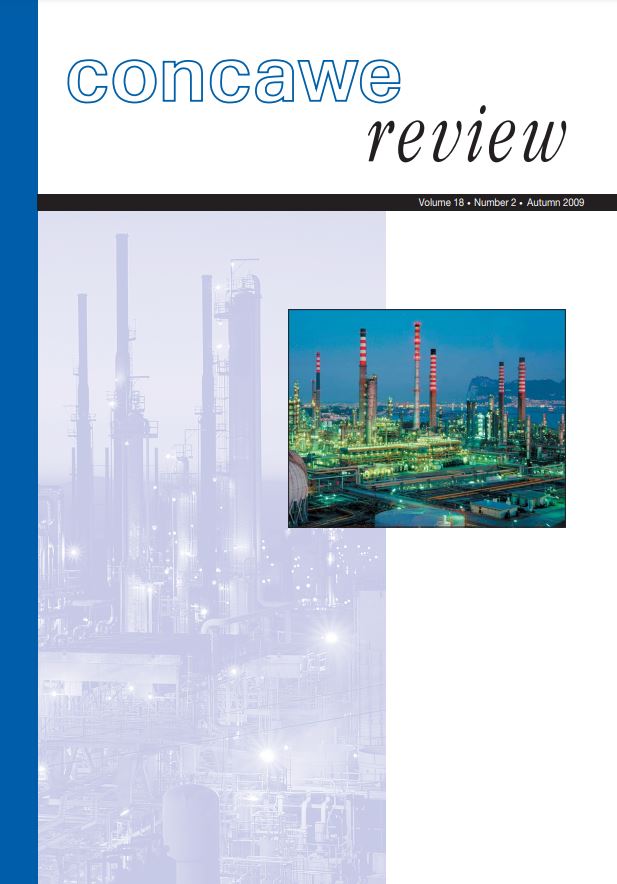
Concawe Reviews
CONCAWE Review • Autumn 2009
Volume 18 • Number 2 • Autumn 2009: At the end of May this year, I took over from Alain Heilbrunn as the Secretary General of CONCAWE. As I had hoped and expected, I have inherited an organisation...
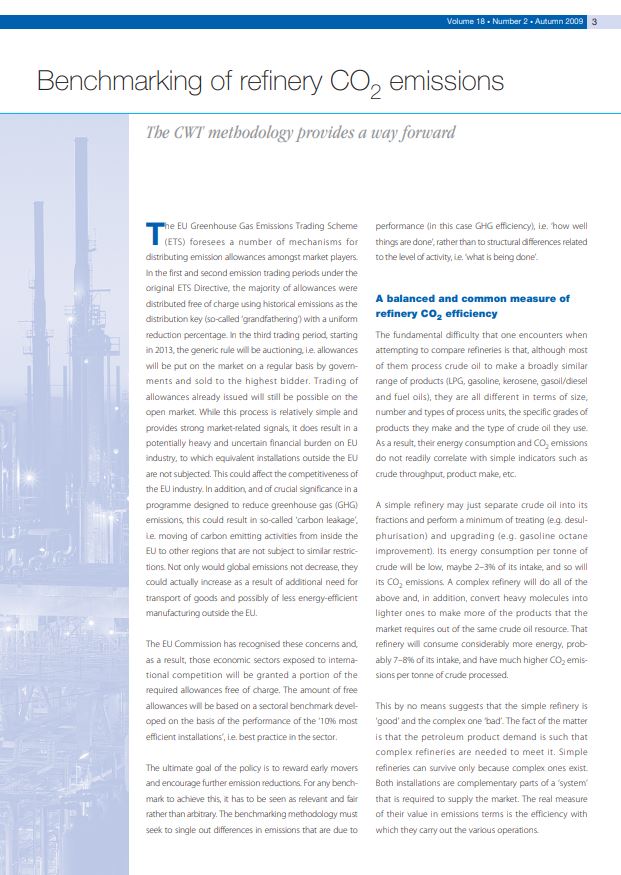
Concawe Reviews
Benchmarking of refinery CO2 emissions
The EU Greenhouse Gas Emissions Trading Scheme (ETS) foresees a number of mechanisms for distributing emission allowances amongst market players. In the first and second emission trading periods under...
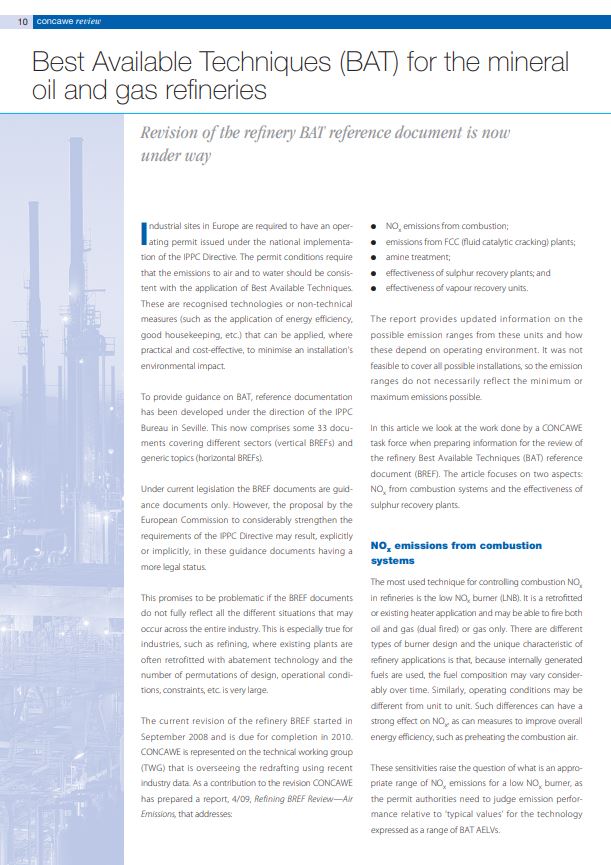
Concawe Reviews
Best Available Techniques (BAT) for the mineral oil and gas refineries
Industrial sites in Europe are required to have an operating permit issued under the national implementation of the IPPC Directive. The permit conditions require that the emissions to air and to wa...
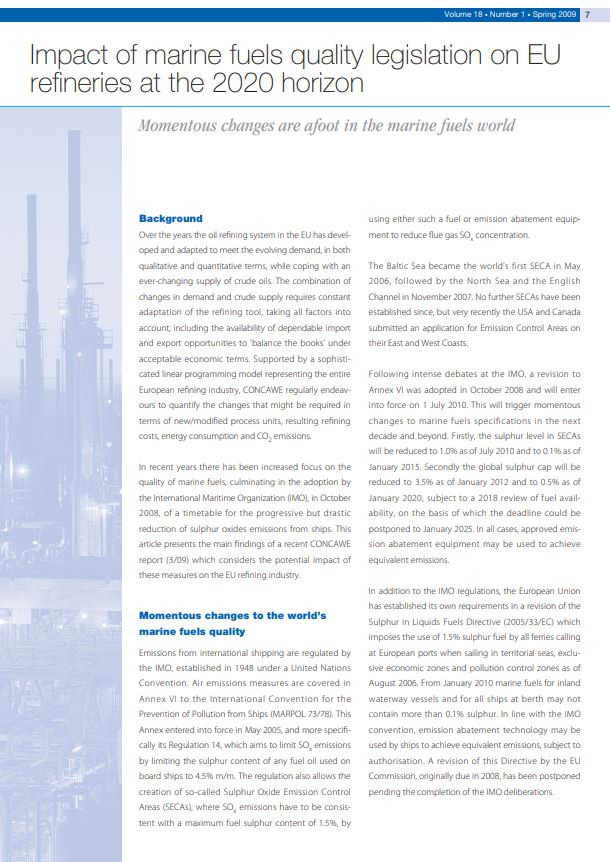
Concawe Reviews
Impact of marine fuels quality legislation on EU refineries at the 2020 horizon
Over the years the oil refining system in the EU has developed and adapted to meet the evolving demand, in both qualitative and quantitative terms, while coping with an ever-changing supply of crude o...
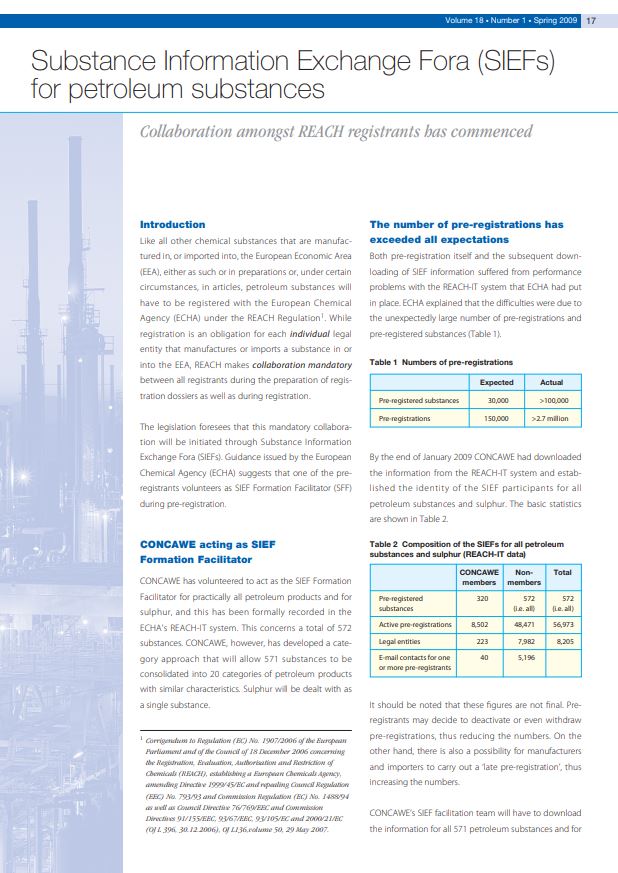
Concawe Reviews
Substance Information Exchange Fora (SIEFs) for petroleum substances
Like all other chemical substances that are manufacture in, or imported into, the European Economic Area (EEA), either as such or in preparations or, under certain circumstances, in articles, petr...
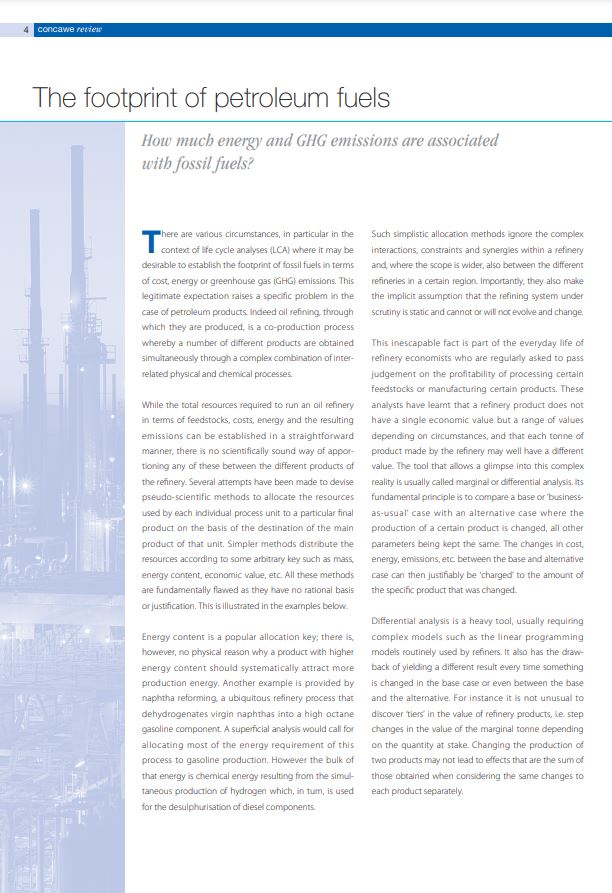
Concawe Reviews
The footprint of petroleum fuels
There are various circumstances, in particular in the context of life cycle analyses (LCA) where it may be desirable to establish the footprint of fossil fuels in terms of cost, energy or greenhous...

Concawe Reviews
CONCAWE Review – Spring 2009
Volume 18 • Number 1: When Concawe's director joined CONCAWE in late 2004, he took the helm of an organisation which had already proved its value to the oil industry through more than 40 years of te...
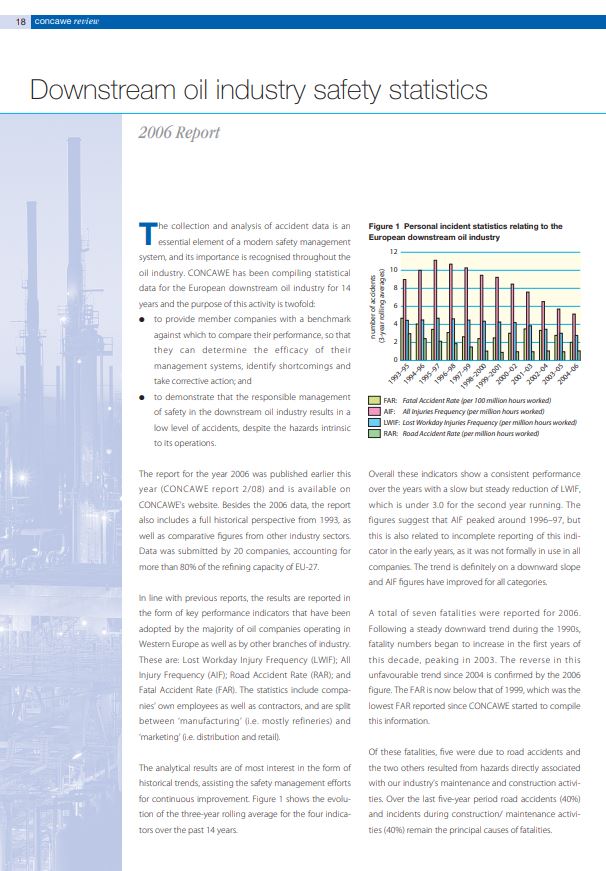
Concawe Reviews
Downstream oil industry safety statistics
The collection and analysis of accident data is an essential element of a modern safety management system, and its importance is recognised throughout the oil industry.
CONCAWE has been compilin...
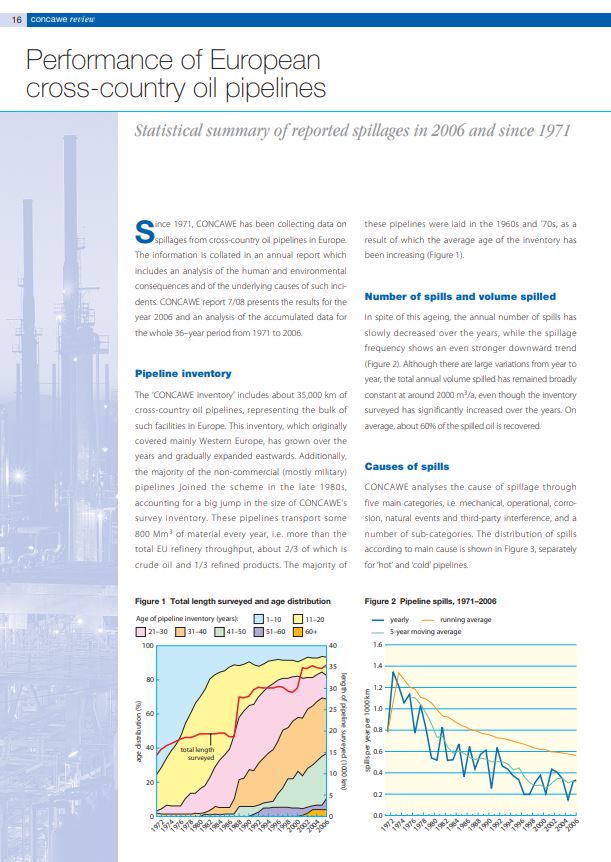
Concawe Reviews
Performance of European cross-country oil pipelines
Since 1971, CONCAWE has been collecting data on spillages from cross-country oil pipelines in Europe. The information is collated in an annual report which includes an analysis of the human and enviro...